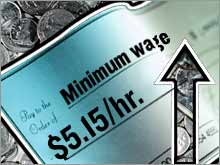Wages are rising. Here's what to watchThe minimum wage is likely to rise next year for the first time in a decade. But debate rages on about whether that's good or bad for America.NEW YORK (CNNMoney.com) -- The federal minimum wage is set to rise for the first time in nearly a decade after the Democrats took the House and voters passed measures to boost the pay threshold in six states. The politics are tilted overwhelmingly in favor. The measures to boost state minimum wages won by big margins in Arizona, Missouri, Montana and Nevada. They won in Colorado and Ohio too but "only" by 53 and 56 percent of the vote. The most recent CNN poll on the issue, conducted Aug. 30-Sept. 2, found 86 percent support for an increase.
What doesn't get a lot of attention is that the federal minimum covers a relatively small minority of workers today. With the votes Tuesday, 29 states and the District of Columbia will have state minimums above the current federal mandate by next year, some $2 or more above. Even if the increase to $7.25 an hour being talked about passes, about a fifth of the nation's labor force will be covered by a higher level set by states after the new federal rate is phased in by 2008. Still, Nancy Pelosi, set to become the first Democratic House Speaker since 1994 and the first woman to ever hold the post, has promised that boosting the federal minimum wage will be one of the first things the Democrats will do when the new Congress convenes in January. Even President Bush, asked about the issue at a news conference Wednesday, said he's open to working with Democrats on the issue. "The Republicans would like to remove this as an issue that the Democrats have been able to use to beat them around the head," said Nigel Gault, chief U.S. economist for Global Insight, a Massachusetts economic consulting firm. The proposal to raise the minimum 41 percent, from today's $5.15 an hour to $7.25 an hour by 2008, has rekindled old debates. Advocates who say a raise is long overdue - the last increase was on Sept. 1, 1997 - note that prices have jumped 26 percent over those nine years. "We're just making up for the lost ground," said Liana Fox, economic analyst with the Economic Policy Institute, a liberal think tank. "I'm very doubtful when I hear claims of economic disaster. We have not seen that in the states that have raised the minimum already." But critics still argue the higher minimum will hurt small businesses, which will be forced to raise prices, cut hiring or slash the hours of the low-wage workers the new law is meant to help. "It's a case where you've got political fantasy trumping sound economics," said Ray Keating, chief economist of the SBE Council, a group representing entrepreneurs and small businesses. "Most economists agree, when you've got people in the work force whose skill level makes their labor worth less than the minimum wage, something has to give." Resistance to a higher minimum wage is coming from small businesses as well as the National Restaurant Association, comprised mostly of small business owners. "Our labor costs are over 30 percent of our cost structure," said Tom Foulkes, vice president for state relations for the restaurant trade group. "You look at how you're going to absorb the costs, you're going to reduce hours, eliminate positions or look at more automation. A self-serve soda fountain eliminates a job." Some have suggested a tax break for small businesses might be part of the minimum wage increase, to make it more acceptable to Republicans. But given the issue's popularity, Democrats might push for things like indexing the minimum wage in the future in exchange for tax breaks. Some economists say indexing the minimum wage, as some states do, could be inflationary. Some Wall Street analysts are concerned that even a straight increase, without indexing, could keep the Federal Reserve from cutting interest rates as soon as some investors had hoped as the central bank eyes the progress of the various proposals. "The reaction by corporate markets is that it will add to inflationary pressure," said Art Hogan, chief market strategist for Jefferies and Co. "There wasn't that much concern about labor costs lifting prices until last week when we got the 4.4 percent unemployment rate. Now there's a lot more attention to that." Investors aren't especially concerned that a higher minimum wage would hurt profits at big employers like Wal-Mart Stores (Charts), Hogan said. In fact the world's biggest retailer has been backing an increase for the last year. "The increase probably impacts their bottom line positively, because their customer base would be getting more money," said Hogan. But even big employers like Wal-Mart and McDonald's (Charts), which pay most employees above minimum wage, could see their labor costs rise as they step up their average pay commensurately. Wal-Mart spokesman David Tovar said the company's average, full-time hourly wage is $10.11 and is even higher in urban areas. He could not say how many employees are at or near the federal or the various state minimums. Shares of Wal-Mart fell Wednesday, but that may have been because the election might also make Congress more likely to approve trade sanctions on Chinese imports, a key source of goods for the retailer. |
| ||||||||||||



